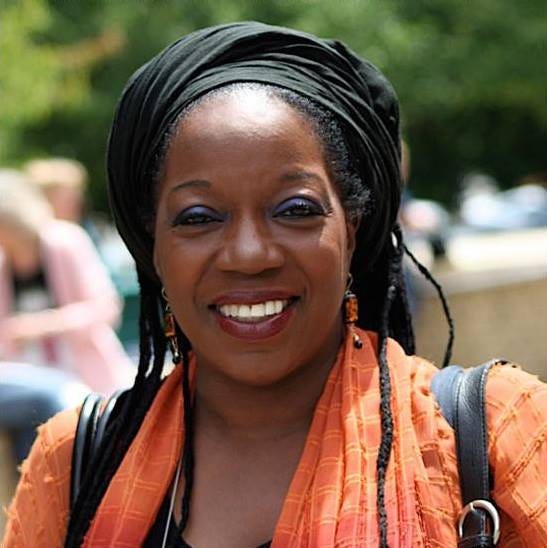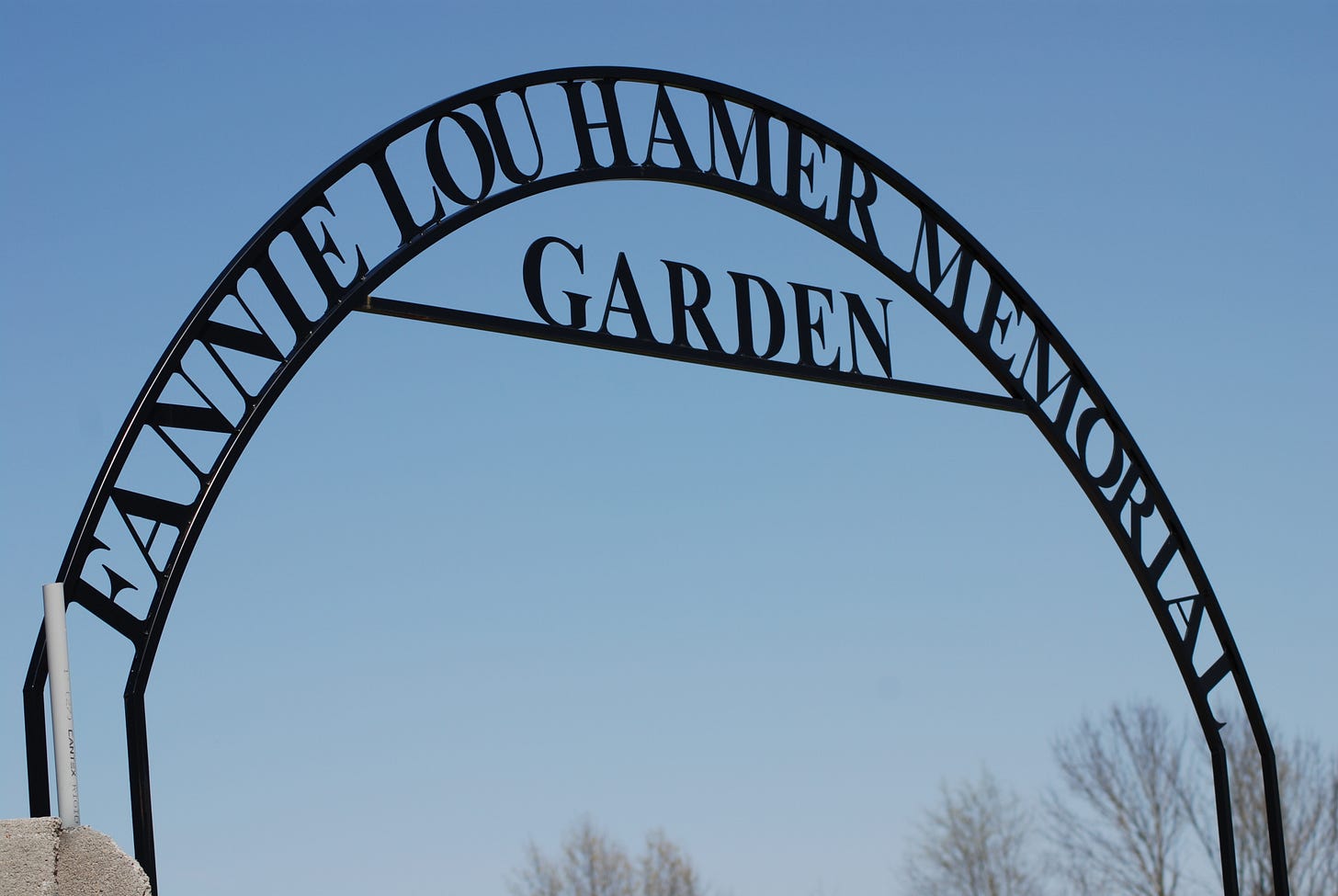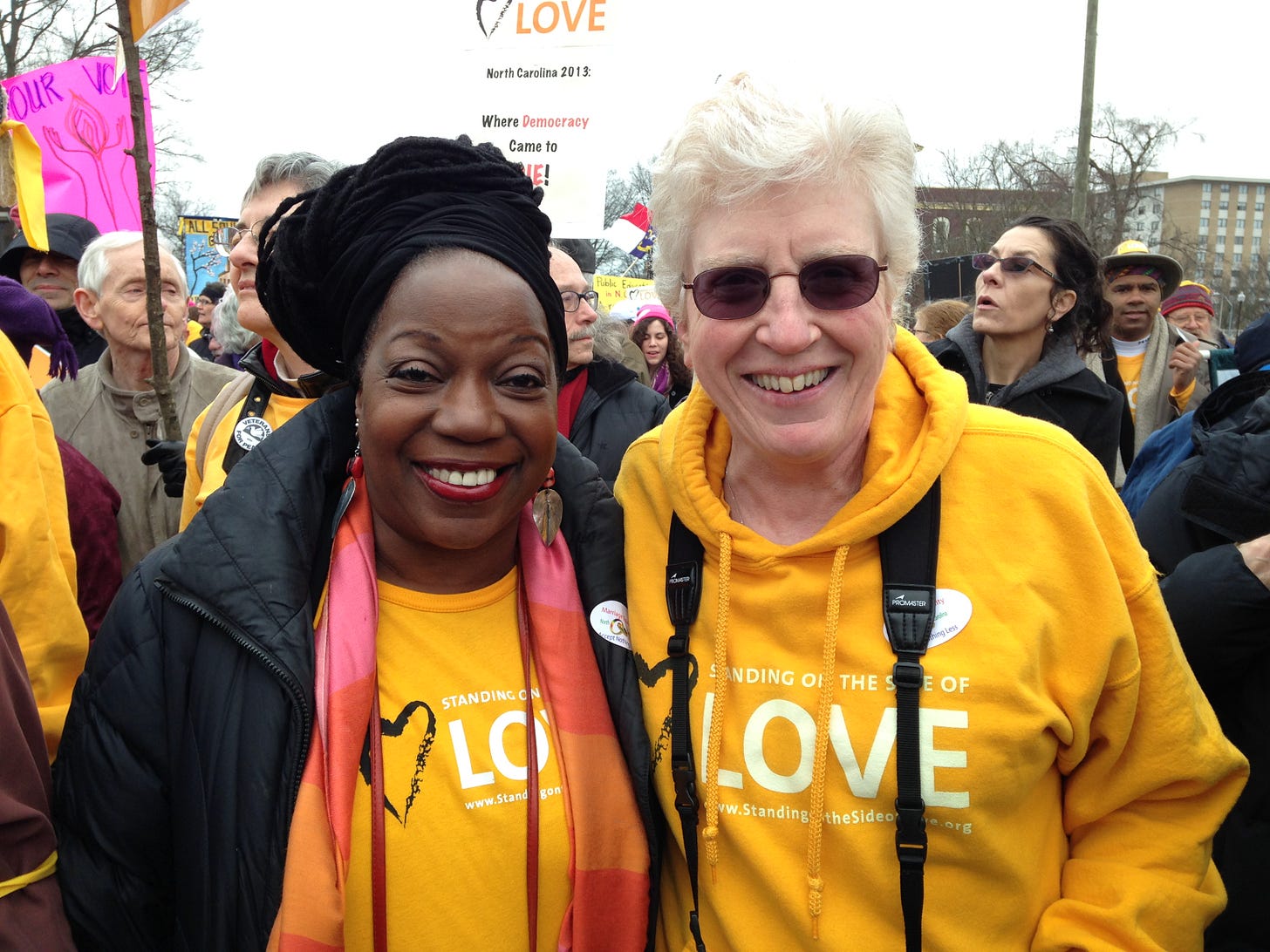Sharing the salt of the earth
Janice Marie taught me the true meaning of what it means to be in solidarity.
Although I had witnessed Janice’s identical twin sister, Hope, in action at the 1993 Unitarian Universalist Association (UUA) General Assembly (you’ll meet her in a future post), it was Janice Marie who first reached out to me in friendship at a 2000 UUA training in Boston.
“Would like you some salt?” she asked as we sat next to each other over lunch.
“Yes, I’d love some!” I said enthusiastically. Janice (pronounced Ja-niece) reached into her purse and pulled out several salt packets.
“You can never have enough salt,” she said as she handed one to me.
“You got that right!” I replied. Over the sharing of a little salt, Janice and I formed a friendship that grew into a sisterhood that continues to run deep and wide.
Janice, shimmering with smooth dark skin and long locks, sometimes hanging down the length of her back, but more often gathered on top of her head, grew up around the globe as the daughter of a diplomat. Her father served as the first ambassador to the United States from the newly independent Jamaica.
“I watched the Union Jack come down and the Jamaican flag go up,” Janice recalled to me. “I was only a child, but it was one of the most moving events of my life.”
Having lived in Europe, and North and South America, she calls herself an internationalist, and her life is a testament to that term. As her personal mantra, she uses a word given to her when she met Mr. Nelson Mandela, “Masakhane,” which means “Let us build together.” Through two key experiences, she taught me how to live into this mantra for myself.
In 2004, I received a phone call from Janice. “I wonder if you’ve heard about the gathering of white UUs at Murray Grove Retreat Center that’s happening next month? I hope you’ll consider attending,” she said. This gathering was scheduled to run concurrently with the annual meeting of a people of color organization, DRUUMM (Diverse and Revolutionary Unitarian Universalist Multicultural Ministries), for which Janice served as president.
“I haven’t,” I said, “but it sounds interesting. Can you send me more information?” I wasn’t sure I wanted to get involved, but I accepted the invitation because Janice asked, and because of saying yes, I began to understand what it meant to move from sitting on the sidelines to becoming an anti-racist activist.
White people left that meeting failing to organize—not surprising to DRUUMM members, but still frustrating and disappointing to those who hoped for more. The meeting, however, set the stage for us to return in 2005. At our second gathering, we successfully formed an organization of white allies called Allies for Racial Equity (ARE), which is committed to unlearning white privilege/supremacy and confronting racism within Unitarian Universalism.
While Janice served as president of DRUUMM, I served as the first chair of the ARE Steering Committee. We worked together to create a safer and life-affirming environment for people of color at General Assembly and throughout Unitarian Universalism, work that DRUUMM and ARE continue today.
With that foundation, it felt fitting for us to be among a small group that joined forces in 2008 to ensure that the Southern civil rights tours started by the Rev. Dr. Gordon Gibson and Judy Gibson would continue. We renamed the tours pilgrimages and founded an organization that I currently serve as Director of Operations, the Living Legacy Project. It was on one of those pilgrimages that I learned the most from Janice about what Masakhane truly means.
We were in Ruleville, Mississippi, at the memorial to Mrs. Fannie Lou Hamer, the fierce voting rights activist who stood up to the Democratic National Credentials Committee at the 1964 Democratic Convention.
Being a political junkie, I’ve always loved Mrs. Hamer’s story, so I was especially excited to stop at the newly developed site honoring her. As a trip leader, I brought the text of her convention speech so I could read it aloud at the site. And I did. Using the Black Mississippian vernacular reflected in the text, and the southern accent I worked so hard to eliminate from my repertoire when I left Arkansas for Michigan, I read her entire speech to the forty, mostly white participants gathered in the site’s pavilion.
When I finished reading, I beamed at Janice. Instead of the affirmation I expected, I received a glassy stare.
“How could you do that?” she said to me, quietly but harshly, as we walked toward the bus. “How, as a white woman, could you try to imitate Mrs. Hamer’s voice like that? What were you thinking?”
I became immediately defensive. “I just read the words as they were on the page,” I said. “I didn’t try to sound like her. I love her story and I just wanted people to hear her words,” I continued.
“Well, what you did was not OK,” Janice said, as she walked on, waving a dismissive hand.
I felt shame, confusion, anger, disappointment, and hurt as I boarded the bus and tried to make sense of Janice’s anger. Tension mounted for the remainder of the day. When Janice, Hope, and I gathered over glasses of wine, as was our evening custom, we continued the conversation. After much back and forth, I finally realized that it was not my place to decide if Janice’s anger was justified. Of course, it was.
I thought I was being an ally by sharing Mrs. Hamer’s story and words. What I had done instead was misappropriate her words for my own self-aggrandizement. It was in that moment that I came to understand the difference between what it means to be an ally and what it means to build together—Masakhane. My responsibility is not to support the work of people of color as they fight for equality as an ally might, but, instead, to share in the work—to be in solidarity. To do that requires me to step back and center historically marginalized voices instead of my own.
I believe that it was at that moment—in that realization—that Janice and I became sisters.
Over the years, Janice and I have worked together as colleagues, comrades, and conspirators. Through her, I’ve learned how to use my white privilege to disrupt and dismantle racism. I’ve learned to better respect individual styles of leadership and recognize that my way is not the only way, or even the best way. I’m far from perfect at it, but I try.
Most of all, Janice has taught me how deep, abiding friendships can form out of difference, and how they can be sustained by supporting each other through both easy and hard conversations, trusting that we are forever sisters.
Next post:







That’s a beautiful story! The gentle teacher! Thank you for sharing it!
Yup! I'll forever love Janice Marie for her fierce and yet gentle nudging/education.
At a NY pizza place in the 90s 'with a number of friends around the table (after I quoted an African American UU Author and scholar to support an opinion I'd stated) Janice (who had already expressed an opposing opinion) said so sweetly- something like "Isn't it interesting when white people invoke Black scholars to strengthen their views? "
Wow!!! The world shifted for mr in that moment. I'll be forever grateful for Janice Marie's gentle teaching, leadership and friendship. In that minute I understood what it meant to step back, listen and learn.